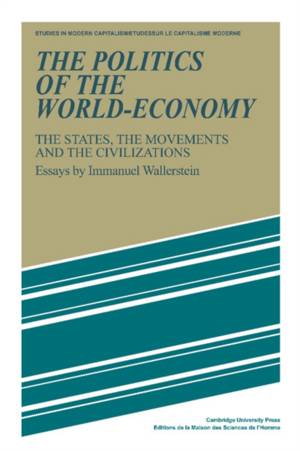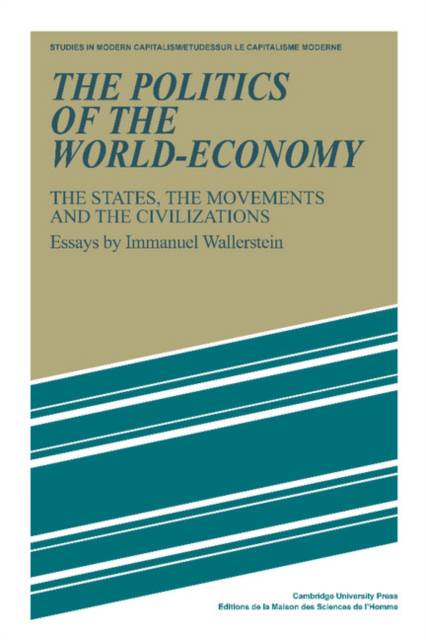
- Afhalen na 1 uur in een winkel met voorraad
- Gratis thuislevering in België vanaf € 30
- Ruim aanbod met 7 miljoen producten
- Afhalen na 1 uur in een winkel met voorraad
- Gratis thuislevering in België vanaf € 30
- Ruim aanbod met 7 miljoen producten
Zoeken
The Politics of the World-Economy
The States, the Movements, and the Civilizations
Immanuel Maurice Wallerstein
€ 41,95
+ 83 punten
Omschrijving
In these essays, written (with one exception) between 1978 and 1982, Immanuel Wallerstein elaborates on the political and theoretical implications of the world-systems perspective outlined in his celebrated books The Modern World-System and The Capitalist World-Economy. Whereas those books centred on the historical development of the modern world-system, the essays in this volume explore the nature of world politics in the light of Wallerstein's analysis of the world-system and capitalist world-economy. Throughout, the essays offer new perspectives on the central issues of political debate today: the roles of the USA and the USSR in the world-system, the relations of the Third World states to the capitalist 'core', and the potential for socialist or revolutionary change. Different sections deal with the three major political institutions of the modern world-system: the states, the antisystemic movements, and the civilizations. The states are a classic rubric of political analysis. For Wallerstein, the limits of sovereignty are at least as important as the powers - these limits deriving from the obligatory location of the modern state in the interstate system. Social movements are a second classic rubric. For Wallerstein, the principal questions are the degree to which such movements are antisystemic, and the dilemmas state power poses for antisystemic movements. Civilizations, in contrast, are not normally seen as a political institution. That however is for Wallerstein the key to the analysis of their role in the contemporary world, and thereby a key to understanding the politics of social science.
Specificaties
Betrokkenen
- Auteur(s):
- Uitgeverij:
Inhoud
- Aantal bladzijden:
- 200
- Taal:
- Engels
- Reeks:
Eigenschappen
- Productcode (EAN):
- 9780521277600
- Verschijningsdatum:
- 29/06/1984
- Uitvoering:
- Paperback
- Formaat:
- Trade paperback (VS)
- Afmetingen:
- 154 mm x 229 mm
- Gewicht:
- 308 g

Alleen bij Standaard Boekhandel
+ 83 punten op je klantenkaart van Standaard Boekhandel
Beoordelingen
We publiceren alleen reviews die voldoen aan de voorwaarden voor reviews. Bekijk onze voorwaarden voor reviews.











